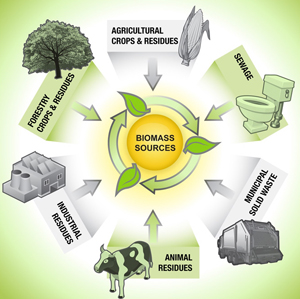We open with some pointed facts, before detailing further in other links under this topic. Agricultural biomass is nature's answer for soil stability and vitality. This includes storage of both water and carbon / energy. Many forms of biomass exist, trees, plants, grasses are the more energy dense forms, easily processed.
Biomass is the only sustainable energy source we have. This is why Carbon Analytic focused in this field. Estimates show a transition to biomass energy can offset up to 70% of fossil fuel needs. Biomass also offers increasing food, cash crops and agricultural benefits without deforesting. In fact more total trees and living biomass can be created than consumed, totally carbon negative.

When fossil fuels were discovered it seemed like endless energy. Unfortunately, today we know its not endless and generates serious pollution. We've continued to doubt, failing to create a sustainable solution. Wind and Solar actually are not sustainable. They also will never provide even 30% of the need.
Further, the economic losses of ending fossil fuels abruptly threatens the vitality of energy producers. This will affect employment and increases risks of exposures of intermittent power outages. We already know extraction of oil and gas and even coal are pushing further damaging technology to reach remaining values. The costs are severe, already stressing prospecting, mining costs and procedures driving up prices. Biomass requires no prospecting.
Natural gas from fossil sources is also not a clean alternative. While it produces less soot during burning, natural gas is methane which does not burn to completion in most gas fired appliances. It is a major source of harmful exposures in the average home, cooking or heating with natural gas. Methane is also more than 80 times more reflective as a greenhouse gas than CO2, which is the final byproduct of methane conversion in the atmosphere. Fracking for natural gas extraction has serious harmful and irreparable effects on clean water and soil preservation. This only extends the long term consequences affecting health trends in recent years.
These economic exposures require a "transition" to biomass fuels. It requires a cooperative effort to include power companies and fuel processing both. That means governing bodies must transition as well. The prospect of wind, solar or hydro-electric to solve the demand will never come to a solution. Our current global use of wind and solar today is less than 3% energy production. In places where higher wind and solar is being tested the weakness of reliability shows a hard limit around 20% contribution to grid power generation. This requires massive battery storage techniques to buffer demand surges. Battery technologies are improving but still remain far off from practical or cost effective at the size and demand required to support 20% wind / solar contribution.
There comes a time when common sense has to rule. As much as we've been told the current developments in wind, solar, hydro and even "safer" nuclear energy will help, they all come with long term negative outcomes. This means they are NOT "sustainable". We need to produce energy from above ground using the means nature provided. The sun's capacity to maintain the energy balance we need is more than sufficient.
Refined biomass CAN do this and community based non-profit initiatives make it possible.
